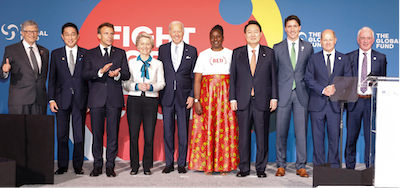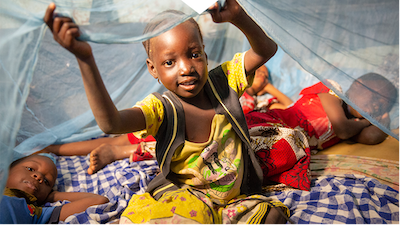While the real winners in the 7th Replenishment of the Global Fund to Fight AIDS, TB and Malaria are the millions of marginalized people who will be enabled to survive and thrive around the world, the September 21 Replenishment Conference held in New York City was a great success, for the Global Fund, for the United Nations, for the United States, and for UNA-NCA. Why?
First, the Conference was a great success for the Global Fund. The Fund collected pledges of over $14.25 billion, to take forward the next three years of Global Fund grant-making in the global fight against AIDS, tuberculosis, and malaria. With a strong dollar this Fall, this sum carries the Fund most of the way towards its $18 billion target under the 7th Replenishment of Fund resources. The private sector, philanthropies, and NGOs joined governments with pledges of nearly $1.3 billion, a significant increase over prior commitments. The Bill and Melinda Gates Foundation alone pledged $912 million. Two major donors – the United Kingdom, as the Queen passed, and Italy, the week before an election – were unable to make pledges on September 21 but are expected to do so soon.
The Replenishment Conference concluded a campaign starting with a Preparatory Meeting in February 2022 co-hosted by the Presidents of Congo-DRC, Kenya, Rwanda, Senegal, and South Africa. All five of these countries have a long history of being strategic partners of the Global Fund, as both implementers and donors. In September, key Global Fund donors, including the U.S. as host, Japan, Canada, Germany, and the European Commission, all increased their pledges by a whopping 30% over the 6th Replenishment, with France close behind as the last host. South Korea quadrupled its pledge and Kenya increased its pledge by two-thirds.
Over the past twenty years, the Global Fund has invested $53 billion, with its partners, as reported in its annual report [insert link: https://www.theglobalfund.org/en/results/] released just prior to the Conference – saving 50 million lives and reducing the combined death rate from HIV/AIDS, TB, and malaria by more than 50 percent in the low and middle-income countries where the Fund invests. The new funding will be invested in the Fund’s 2023-2025 grant cycle, to reach over 120 low- and middle-income countries. The resources will increase much needed global capacity to combat the three diseases ats the Fund’s core, and they will contribute to more resilient health systems better prepared for future health security threats.
“Whether we actually get there [to the Replenishment goal] today, or we get there subsequently, in the next few months or so, it doesn’t really make a difference,” observed Dr. John Nkengasong, the U.S. Global AIDS Coordinator. “I think what matters is that we see a strong political commitment, strong political will, and strong political leadership.”
The pressure on the United Kingdom to contribute generously despite recent changes in government will be strong as it has traditionally been the second largest donor (after the United States). The other major donor countries pledged increases twice the average increase in the 6th Replenishment. As the Fund has a striking record of near complete conversion of pledges to actual payments, I am confident that it will build successfully on its achievements to achieve fully its $18 billion 78th Replenishment target.
Beyond dollars and cents, we need to remember that the Global Fund and its UN and other partners respond to crises. Since the Russian invasion of Ukraine in February, the Fund reports that over 320 Ukrainian health facilities have been damaged or destroyed. The Fund has provided $15 million in emergency assistance. Also, it has reprogrammed $25 million to adapt to the changing circumstances in Ukraine. It may also be noted that Russia did not pledge support to the Fund in September, nor did it do so in the 6th Replenishment of this important multilateral organization.
 Second, for the United Nations, the Conference was a great success because the Fund was created in 2002 at the initiative of then UN Secretary-General Kofi Annan. The 7th Replenishment Conference was held on the margins of the UN General Assembly, and benefited from the presence of over 45 countries, including 18 heads of state and government who came to the United Nations for its annual High-Level Week.
Second, for the United Nations, the Conference was a great success because the Fund was created in 2002 at the initiative of then UN Secretary-General Kofi Annan. The 7th Replenishment Conference was held on the margins of the UN General Assembly, and benefited from the presence of over 45 countries, including 18 heads of state and government who came to the United Nations for its annual High-Level Week.The Fund has had a long and fruitful relationship with UN agencies and programs, including UNDP, WHO, and UNAIDS. Indeed, if we understand the United Nations not only as a set of legal entities but also as a large group of collaborating organizations, then I think the Global Fund must be considered part of the wider United Nations and multilateral family Network devoted to the UN’s Sustainable Development Goals – the SDGs.
The Replenishment Conference became an occasion to observe multilateral cooperation work successfully in the larger UN Network. As Tara Bracken of the UN Foundation observed, “It’s becoming more and more clear that this Replenishment is an opportunity for the world’s leaders not just to help defeat HIV, TB, and malaria but also to solidify their commitment to multilateral cooperation and partnership. The challenges facing the global community are numerous and urgent: conflict and climate change-induced humanitarian crises, food insecurity, the ongoing COVID-19 pandemic and emergence of new health threats and increasing economic pressure — among many others. These challenges are too great in scale and far-reaching in their impacts for any one country or sector to solve alone. Rather than being used as an excuse to pull away from multilateral partnerships like the Global Fund, these challenges should serve as a reminder that multilateral cooperation is more critical than ever.”
Third, for the United States, the Conference was a great success because of the participation and the results. President Biden hosted the Conference and announced the largest ever U.S. pledge of $6 billion. The Conference dramatically illustrated his commitment to return to the United Nations and multilateral diplomacy in the larger UN Network. "Now is the moment,” he said, “to accelerate our efforts, to reduce health inequities, to reduce barriers to access — including gender and human rights barriers — and to build more inclusive health care systems to leave no one behind." The President’s reference to leaving no one behind picks up an underlying theme of the UN’s SDGs. It must surely resonate strongly with survivors struggling to cope with effects of the recent Florida hurricane and Pakistani floods. The President summed up, “We have to ensure that everyone – no matter who they are, who they love, where they come from – can access care and treatment they need.” By design at its creation, human rights for all and equity of access has been at the Global Fund’s core.
“At a moment when the world is confronted by acute economic and political challenges and climate-driven disasters, President Joe Biden delivered an unparalleled mobilization of resources for global health,” said Peter Sands, Executive Director of the Global Fund. “We are extremely grateful for the generosity of everyone who has committed to support our partnership. With the intersection of so many global crises, our donors understand that it is more important than ever to stop these deadly diseases and protect everyone, regardless of who they are or where they live, from these and future health threats.”
Fourth, for UNA-NCA, the Global Fund Replenishment Conference was a great success because of the catalytic, behind-the-scenes role played by UNA-NCA Advisory Council member Mark Lagon, among multistakeholder partners. Recipient of the UNA-NCA Louis B. Sohn Award for human rights in 2015, Mark is a thought leader on global governance and multilateral institutions, global health, human rights and human trafficking. He has been a guest speaker and mentor in the UNA-NCA Graduate Fellows Program. Beyond his former roles in the State Department, including as Deputy Assistant Secretary in the International Organizations Bureau and as Ambassador-at-large in the fight against human trafficking, at Freedom House, as its President, and at Georgetown University, as a professor, Mark is currently Chief Policy Officer of the Friends of the Global Fight Against AIDS, TB and Malaria – an NGO which collaborates closely with the Global Fund on policy and advocacy.
In the latter role, he was deeply engaged in promoting success in the 7th Replenishment by coordinating outreach to the executive and legislative branches of the US Government, policy advocacy, and especially civil society coalitions with partners in the U.S., other donor countries, the Global South – indeed, the whole world.
Mark has also contributed to the gradual evolution of the Global Fund’s role beyond its three initial diseases. He observed in an August 2022 Foreign Affairs article, “The Global Fund has played a major role in most non-vaccine aspects of the global COVID-19 response. In many low- and middle-income countries, it has been the top financial supporter for tests, therapeutics, and personal protective equipment.”
As a former Capitol Hill staffer, Mark knows the importance of reaching out across the aisle for bipartisan support. Under the leadership of its CEO, Chris Collins, the Friends of the Global Fight mobilized critical support for the Global Fund Replenishment from House Speaker Nancy Pelosi and key Senate leader on foreign aid Lindsey Graham, as can be observed in a video from a Friends of the Global Fight event: Celebrating Bipartisan Congressional Leadership in the Global Fund: “50 million reasons why support for the Global Fund is bipartisan.” The Friends organization also sponsored research reports demonstrating how the epidemics of AIDS, TB, and malaria each could be ended. A holistic U.S. strategy can advance health safety and equity, and disease-specific programs can strengthen health systems and pandemic preparedness. Friends and Mark were also in constant contact and collaboration with leaders in the Global Fund at its Headquarters in Geneva.
The Friends of the Global Fight where Mark is a leading voice is one of four ‘Friends’ organizations across the globe working for donor country and world-wide support for the Fund. Friends U.S., Friends Europe and Friends Japan collaborate constantly. Civil society has forged a global network in the form of the Global Fund Advocates Network (GFAN). GFAN brings together advocates, activists, and affected communities in the South and the North, as well as the Friends of the Fund organizations. The overall purpose of GFAN is to build a global social movement to demand health for all by recruiting, connecting, and mobilizing advocates to communicate the urgent need and demand full funding for the Global Fund to maximize its impact. More than 350 organizations in 90 countries currently collaborate and share information through GFAN. It held multiple global calls to ensure advocate participation in development of the Global Fund 2023-
 2028 strategy, discuss resource mobilization needs for the Global Fund and early planning for Global Fund replenishment campaigns, and global campaigns for universal health coverage, domestic resource mobilization, and human rights and gender equality. With this network of partners, Mark Lagon demonstrates UN and UNA-NCA values in action: Helping in bringing the world together towards achievement of SDG 3, helping to ensure healthy lives, and promoting well-being for all at all ages.
2028 strategy, discuss resource mobilization needs for the Global Fund and early planning for Global Fund replenishment campaigns, and global campaigns for universal health coverage, domestic resource mobilization, and human rights and gender equality. With this network of partners, Mark Lagon demonstrates UN and UNA-NCA values in action: Helping in bringing the world together towards achievement of SDG 3, helping to ensure healthy lives, and promoting well-being for all at all ages.







